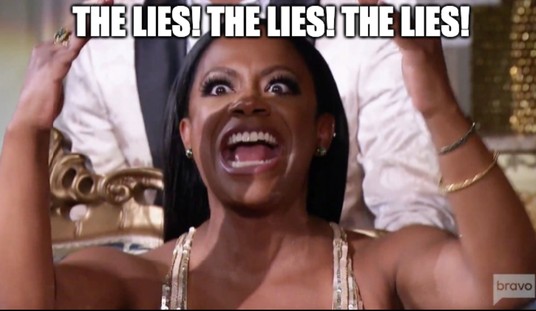Since yesterday, this video has been going viral:
NEW: Indianapolis mother walks free after admitting to smothering her 2-month-old baby to death between two couch cushions while high on meth.
— Collin Rugg (@CollinRugg) April 18, 2024
Judge Mark Stoner found Dacia Lacey not guilty of neglect resulting in death.
Lacey confessed that she wanted her daughter to stop… pic.twitter.com/YCe0Qcjagz
The cut off text reads:
Lacey confessed that she wanted her daughter to stop crying and just be quiet so she could get some sleep.
The mother, who was high on meth, smothered her daughter in the couch cushions.
Judge Stoner said that prosecutors didn’t do enough to prove she intentionally harmed her baby.
Lacey was facing 20 to 40 years in prison.
We like Mr. Rugg, and we don’t think he is lying or otherwise doing anything but trying to be as accurate as possible, but we think the record needs to be corrected, here. One has to understand that the quality of legal reporting is typically awful and because of that, we think people are not understanding what the judge is saying. The judge seems to have believed that she intentionally harmed her child and that was the problem.
Allow us to explain.
First, this was a bench trial, i.e. no jury was present. Thus, the judge finds the facts, and then determines whether or not those facts fit the crime. Defense attorneys generally pick a bench trial when they are looking for the fact finder to be dispassionate and purely logical and it was clearly the right call in this case. They were asking the judge to let person who apparently confessed to awful behavior go free and you can only do that dispassionately and logically. And as the judge himself said, 'reluctantly.'
The gist of the issue is found in the link provided here:
Judge finds Indy mother not guilty of neglect in the death of 2-month-old girl | Fox 59 https://t.co/oLtkcwayg7
— LongConvexity (@LONGCONVEXITY) April 18, 2024
From the article:
An Indianapolis mother is found not guilty after being accused of neglect resulting in the death of her 2-month-old daughter.
Inside a home on Burton Avenue in August 2022, police found a 2-month-old girl unresponsive. The newborn child, identified as Alona Lacey, died on scene.
Five months later, in January 2023, the girl’s mother Dacia Lacey was charged with causing her child’s death.
Before announcing his verdict, Judge Mark Stoner told the suspect she was a bad parent and she was not innocent.
The judge believed she was guilty of involuntary manslaughter, but because she wasn’t charged with that crime he instead found her not guilty of neglect resulting in death.
The first thing to understand here is that in law, there is a world of difference between negligent and intentional conduct. To quote Justice Oliver Wendel Holmes, Jr., ‘even a dog distinguishes between being stumbled over and being kicked.’
Recommended
What Judge Stoner is saying is that Lacey definitely committed involuntary manslaughter. That crime is found in Indiana Code § 35-42-1-4 which says in relevant part:
(b) A person who kills another human being while committing or attempting to commit:
(1) a Level 5 or Level 6 felony that inherently poses a risk of serious bodily injury;
(2) a Class A misdemeanor that inherently poses a risk of serious bodily injury; or
(3) battery;
commits involuntary manslaughter, a Level 5 felony.
So, it is a person killing a person (whether they intended to kill or not) while committing any number of other crimes. In this case, we think the Judge considered what she did a battery, an intentional crime.
(It is worth noting for pro-life people that the same statute makes it also a crime to do the same thing to a fetus, with exceptions in another statute that relate to abortion and certain medical mistakes.)
By comparison, the charge she was acquitted of, Neglect of a Dependent Resulting in Death, is found in Indiana Code § 35-46-1-4 and is described as follows:
(a) A person having the care of a dependent, whether assumed voluntarily or because of a legal obligation, who knowingly or intentionally:
(1) places the dependent in a situation that endangers the dependent's life or health;
(2) abandons or cruelly confines the dependent;
(3) deprives the dependent of necessary support; or
(4) deprives the dependent of education as required by law;
commits neglect of a dependent, a Level 6 felony.
(b) However, the offense is: …
(3) a Level 1 felony if it is committed under subsection (a)(1), (a)(2), or (a)(3) by a person at least eighteen (18) years of age and results in the death or catastrophic injury of a dependent who is less than fourteen (14) years of age …
Once again, we have cut out a lot of text that is irrelevant to this discussion. We should note that the first part, requiring that a ‘A person hav[e] the care of a dependent, whether assumed voluntarily or because of a legal obligation’ is almost certainly met by the mere fact she was the child’s mother and she apparently had custody of the child. But the rest of the statute concerns itself with situations where the person failed to do something. That’s not what she did, according to the judge. She smothered her child, according to him. And so that isn’t neglect, that is an intentional attack on the child.
Indeed, the article we quoted from was slightly incomplete in the description of what the judge said. You can see video that includes a bit more of Judge Stoner’s verdict here:
What we want to hone in on is that the judge also said that in addition to being willing to convict her of Involuntary Manslaughter, he also said that he would be willing to convict her of Reckless Homicide.
At first glance, that might seem to contradict our claim that the problem here is that the judge is saying in paraphrase ‘it’s not neglect because her actions were intentional’ because most of the time in the law, recklessness refers to extreme carelessness, not intentional conduct. However, in Indiana law, recklessness can include intentional acts. This is how Indiana Code § 35-42-1-5 defines Reckless Homicide itself:
A person who recklessly kills another human being commits reckless homicide, a Level 5 felony.
Which is pretty obvious language, but Indiana Code § 35-42-2-2 is where we are told what counts as ‘criminal recklessness’ (in relevant part):
A person who recklessly, knowingly, or intentionally performs an act that creates a substantial risk of bodily injury to another person commits criminal recklessness.
Thus, while lawyers from other jurisdictions (including this author) might be taken by surprise by a definition of recklessness that literally includes more than just recklessness, our point is that the judge is being consistent in saying Lacey’s conduct was intentional. She didn’t trip and fall while holding a couch cushion and accidentally smother her child. She intentionally smothered her child, according to Judge Stoner.
Now, to be fair to Rugg, the article we quoted from also says the following:
At the end of her trial, Judge Stoner chastised Lacey saying her actions were reckless. Stoner though insisted prosecutors didn’t prove she intentionally harmed her daughter.
But we think that this reporting is simply wrong. So, to be clear, we think Rugg is definitely not lying or even being negligent. We think he is simply unknowingly repeating inaccurate reporting.
We say that because legal reporting tends to be very poor. Even when we are convinced that the journalist in question is really trying to get things right (as we think the reporters involved in this case are), journalists as a group really struggle to understand what is going in the law. So, while logically it could be the case that the judge doesn’t understand the law, our guess is the journalists didn’t understand what the judge was saying. And to be fair to the journalists, he mentioned reckless homicide, and even a person who knows a lot about the law might be tripped up on Indiana’s unique definition of criminal recklessness.
The reason why this author says this is because the judge's words would be so nonsensical if true, we can’t believe it without better evidence than ‘a reporter said so.’ And we have tried hard to find a full video of the verdict and our best google skills didn’t give us anything.
For instance, the neglect statute doesn’t require any intent to harm. So saying ‘prosecutors didn’t prove she intentionally harmed her daughter’ isn’t a defense to neglect. The neglect has to be either knowingly or intentionally—a parent accidentally leaving their child in a car on a hot summer’s day because they forgot the child was there won’t trigger the statute—but the statute doesn’t require an intent to commit harm. Even the enhancement for when the child dies will kick in if the neglect merely ‘results in the death or catastrophic injury of a dependent’—regardless of what the person intended. So the state is not required to prove she intended harm under the neglect statute. Likewise, the judge positively saying she is guilty of involuntary manslaughter indicates that the judge clearly thought she definitely intentionally battered her child, but only accidentally killed her. That requires the judge to believe she intended harm, but he wasn't necessarily convinced beyond a reasonable doubt she intended death. Put simply, the things the article says he said about intent to harm is impossible to square with we know he said about her being guilty of involuntary manslaughter and not guilty of neglect.
And yes, that means we should be careful not to engage in Gell-Mann Amnesia, as described by the late, great Michael Creighton:
Briefly stated, the Gell-Mann Amnesia effect is as follows. You open the newspaper to an article on some subject you know well. In Murray's case, physics. In mine, show business. You read the article and see the journalist has absolutely no understanding of either the facts or the issues. Often, the article is so wrong it actually presents the story backward—reversing cause and effect. I call these the ‘wet streets cause rain’ stories. Paper's full of them.
In any case, you read with exasperation or amusement the multiple errors in a story, and then turn the page to national or international affairs, and read as if the rest of the newspaper was somehow more accurate about Palestine than the baloney you just read. You turn the page, and forget what you know.
So, uh … don’t do that. Remember how much incompetence you see in areas you are aware of, and recognize that it might be infecting areas where you have less expertise.
To be fair to reporters, reporters can’t know everything about everything and very often they are called to report facts on pretty much everything. We think everyone is trying their best to get it right in this case. We don’t think anyone is blinded by ideology, let alone lying to promote an agenda. But we think that what Judge Stoner was actually saying is being misstated.
We also wonder whether or not the prosecutors screwed up by failing to charge Lacey with Reckless Homicide or Involuntary Manslaughter, but we don’t know enough about Indiana Criminal Procedure to weigh in on that question. For instance, for all we know Lacey could only have been charged with those crimes by indictment and for some reason the Grand Jury wouldn’t give them that indictment. But we do think the prosecutors should take a moment to explain to the public how this could happen—how could it be that a judge literally told them that she was guilty of certain charges that somehow she wasn’t charged with, and, therefore, the woman can walk free despite everything that happened.
After all, part of the purpose of the criminal justice system isn’t just to punish the guilty and discourage other people from engaging in the same conduct: It is to prevent a criminal, at least while they are in custody, from committing the same crime again. The video indicates that her surviving child is now with her father and we suspect Lacey will never get custody or unsupervised visitation over the child again, but what if some unsuspecting person asks her to be a babysitter? If she applies to work in a day care, will their background search turn up this case? Technically she has no conviction, but anyone who reads up on the case (perhaps by Googling her name) would probably conclude she is not safe around children. However, the question is whether or not people will do the research to find this out and we are not sure the answer is ‘yes.’
We will note (in case you didn’t know) that the judge is essentially powerless to charge Lacey with anything. He can only figure out if she is guilty of the charges she was facing. We understand that this is different in other countries, for instance those that follow an inquisitorial justice system.
And unfortunately, we don’t think that the prosecutors can just charge her now with the correct charges. Unless there is some loophole we are unaware of, that would likely violate Double Jeopardy. The government almost certainly had only one shot at this case, and, somehow, they failed to go forward with the correct charges. But like with OJ Simpson, it is theoretically possible for someone in the family to pursue a civil suit.
In any case, the confusion naturally infected reactions to the story.
I’m shocked. I guess being stoned or drunk and abusing your kids is a forgivable act and you won’t do jail time. Unbelievable https://t.co/J0OwauWqZ5
— Jodi (@APLMom) April 18, 2024
Except if the judge was calling it involuntary manslaughter, that would be rejecting the ‘I was high’ defense.
“The murder rates are going down” lie is this. They aren’t. Judges are letting murderers walk free. https://t.co/hVqBSPX5LN
— Jael’s Mallet (@TentSpike) April 18, 2024
While she is wrong about this particular judge, she is making a point that appears to be true overall. If the judge doesn’t convict—or the cops don’t even arrest a person—for a crime, typically it doesn’t show up in official statistics.
There are some trying to use this case to race bait...pretending that if she were a white woman, she'd have the book thrown at her.
— Jeff Charles, An Awful Pundit🏴 (@jeffcharlesjr) April 18, 2024
If I'm being charitable, I'd just say they are reacting emotionally without actually thinking it through.
But some of them are really this… https://t.co/221AOHLKVZ
The cut off text reads: "But some of them are really this stupid."
We see no evidence that race played a part at all in the case. We suppose some people reacting are being racist, but we haven't seen it. Still, we think the judge is essentially right—she wasn’t charged with the right crime. This outcome is outrageous, but the blame seems to be on the people who charged her. And we don't think the outcome would have been different if she was a different color.
Woman privilege. A father would never get this ruling. https://t.co/brxZz3EbXb
— Ashe Short (@AsheSchow) April 18, 2024
Again, bad information takes its toll, but in full context, the judge does not seem to be going easy on her based on her sex.
This is so f’d up. 😞 https://t.co/DjmD8LRFQw
— 🇺🇸Sheri (@SheriCarter18) April 18, 2024
Agreed, but the blame seems to be on the charging process.
If our justice system continues to coddle criminals like this, you're going to have street justice. https://t.co/ps1TxuxTOm
— Mark Delbridge 🇺🇲🏴☠️ (@DelbridgeMark1) April 18, 2024
This is a valid point and true whoever is to blame for this debacle. While we don’t endorse true vigilantism (meaning private citizens using unlawful violence to stop or punish crime), it is fair to predict it might happen—either in this case and in others where the law cannot or will not achieve justice. We don’t know if this outcome is an example of leftists being soft on crime, refusing to charge her with what the judge thought she deserved, but we do know that their overall soft on crime approach is playing with fire.
Again, we are not advocating for vigilantism, but we are predicting it, unless the people in charge of the enforcement of our laws do their jobs. It is the best way to reduce vigilantism in the long term.

























Join the conversation as a VIP Member